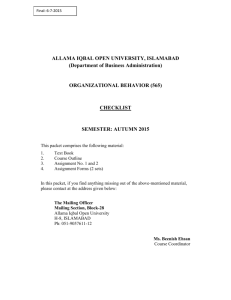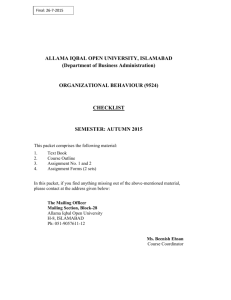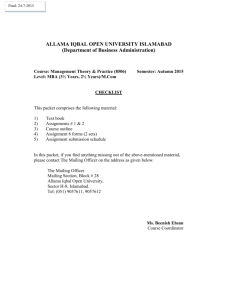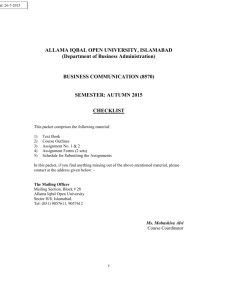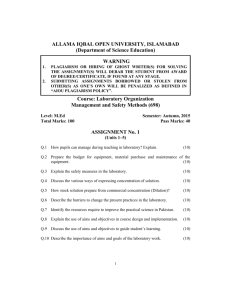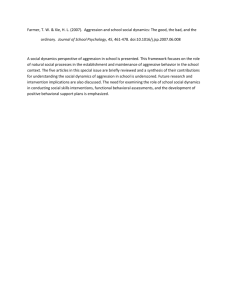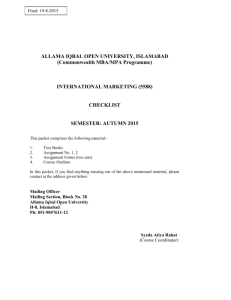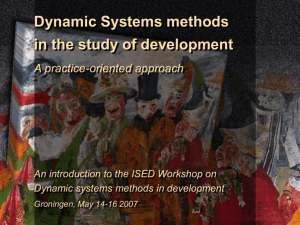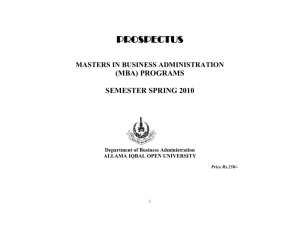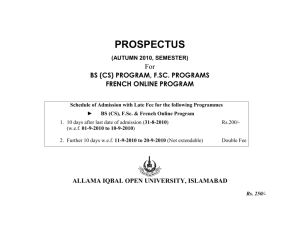- Allama Iqbal Open University
advertisement
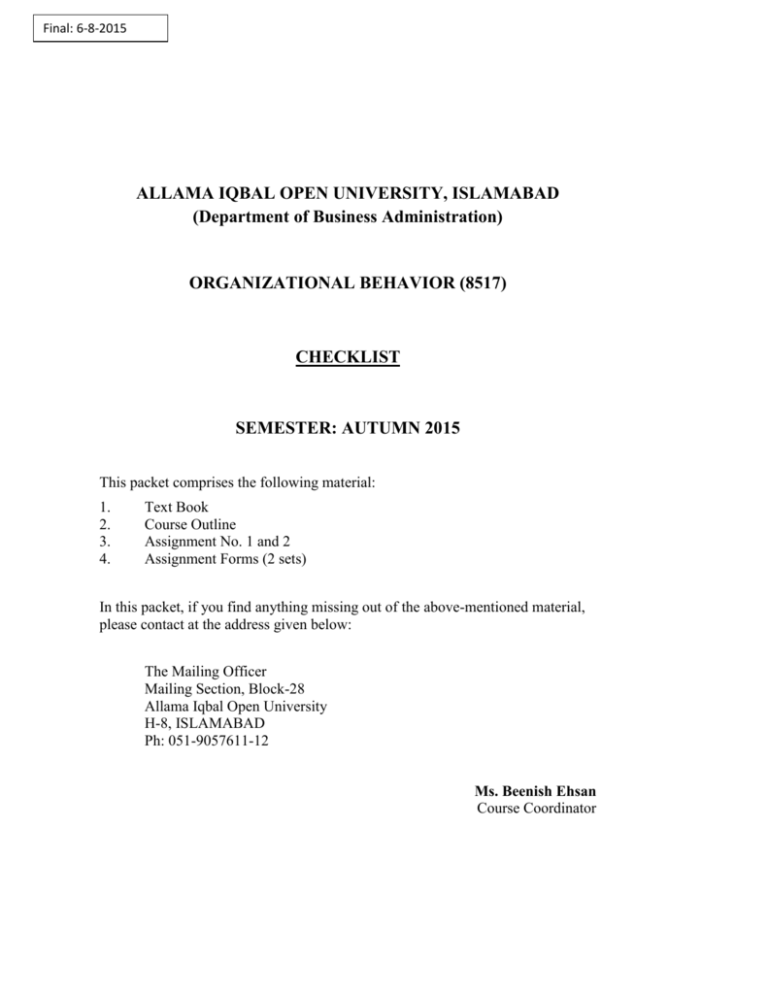
Final: 6-8-2015 ALLAMA IQBAL OPEN UNIVERSITY, ISLAMABAD (Department of Business Administration) ORGANIZATIONAL BEHAVIOR (8517) CHECKLIST SEMESTER: AUTUMN 2015 This packet comprises the following material: 1. 2. 3. 4. Text Book Course Outline Assignment No. 1 and 2 Assignment Forms (2 sets) In this packet, if you find anything missing out of the above-mentioned material, please contact at the address given below: The Mailing Officer Mailing Section, Block-28 Allama Iqbal Open University H-8, ISLAMABAD Ph: 051-9057611-12 Ms. Beenish Ehsan Course Coordinator ALLAMA IQBAL OPEN UNIVERSITY, ISLAMABAD (Department of Business Administration) WARNING 1. 2. PLAGIARISM OR HIRING OF GHOST WRITER(S) FOR SOLVING THE ASSIGNMENT(S) WILL DEBAR THE STUDENT FROM AWARD OF DEGREE/CERTIFICATE, IF FOUND AT ANY STAGE. SUBMITTING ASSIGNMENT(S) BORROWED OR STOLEN FROM OTHER(S) AS ONE’S OWN WILL BE PENALIZED AS DEFINED IN “AIOU PLAGIARISM POLICY”. Course: Organizational Behavior (8517) Level: MBA (3½ Years) Semester: Autumn 2015 Total Marks: 100 Pass Marks: 50 GUIDELINES FOR ASSIGNMENT No. 1 & 2: You should look upon the assignments as a test of knowledge, management skills, and communication skills. When you write an assignment answer, you are indicating your knowledge to the teacher: Your level of understanding of the subject; How clearly you think? How well you can reflect on your knowledge & experience? How well you can use your knowledge in solving problems, explaining situations, and describing organizations and management? How professional you are, and how much care and attention you give to what you do? To answer a question effectively, address the question directly, bring important related issues into the discussion, refer to sources, and indicate how principles from the course materials apply. You must also be able to identify important problems and implications arising from the answer. For citing references, writing bibliographies, and formatting the assignment, APA format should be followed. ASSIGNMENT No. 1 Q. 1 Define organizational behavior. Also discuss different challenges faced by management. (20) Q. 2 Discuss the following in relation to the organizations working in Pakistan. (a) Learning Organizations (b) Motivation 2 (10) (10) Q. 3 Explain process and contemporary theories of motivation. (20) Q. 4 Describe group dynamics and teams. (20) Q. 5 Define occupational stress and explain its effects. (20) ASSIGNMENT No. 2 (Units: 1–9) Total Marks: 100 Pass Marks: 50 This assignment is a research-oriented activity. You are required to submit a term paper and present the same in the classroom prior to the final examination. Presentation component is compulsory for all students. You will have to participate in the activity fully and prepare a paper of about 15 to 20 pages on the topic allotted to you. The students are required to prepare two copies of Assignment No. 2. Submit one copy to your teacher for evaluation and the second copy for presentation in the classrooms in the presence of your resource persons and classmates, which will be held at the end of the semester prior to final examination. Include the following main headings in your report:a) Introduction to the topic b) Important sub-topics c) Practical aspects with respect to the topic d) Review of theoretical and practical situations e) Merits, demerits, deficiencies or strengths of the organization with respect to your topic f) Conclusions and recommendations g) Annex, if any You must use transparencies, charts or any other material for effective presentation. You are also required to select one of the following topics according to the last digit of your roll number. For example, if your roll number is D-3427185 then you will select topic No.5 (the last digit):Topics: 0. Socialization 1. Work motivation 2. Occupational stress 3 3. Communication in an International environment 4. Intergroup conflicts 5. Decision making 6. Role of information technology in the organization 7. Managerial leadership across culture 8. Challenges faced by management 9. Interactive communication in organizations DETAILED COURSE OUTLINE ORGANIZATIONAL BEHAVIOR (8517) Unit 1: Overview of Organizational Behavior 1.1 Organizational Behavior: Theoretical Framework 1.1.1 Defining Organizational Behavior 1.1.2 Historical Background for Modern Organizational Behavior 1.1.3 Challenges Faced by Management 1.1.4 Organizational Behavior Model 1.2 Emerging Organizations 1.2.1 Role of Information Technology 1.2.2 Total Quality Management 1.2.3 Learning Organizations Unit 2: Micro Perspective of OB–I 2.1 Perception Process and Impression Management 2.1.1 Meaning and Significance of Perception 2.2 Individual Perceptual Process 2.2.1 Perceptual Selectivity 2.2.2 Perceptual Organization 2.2.3 Social Perception 2.3 Impression Management 2.4 Personality and Attitudes 2.4.1 Meaning of Personality 2.4.2 Development of Personality and Socialization 2.4.3 Nature and Dimensions of Attitudes 2.4.4 Job Satisfaction and Organizational Commitment 4 Unit 3: Micro Perspective of OB–II 3.1 Motivation: Needs, Content and processes 3.1.1 Meaning of Motivation 3.1.2 Types of Motives 3.1.3 Theories of Motivation 3.1.3.1 Content Theories of Work Motivation 3.1.3.2 Process Theories of Work Motivation 3.1.3.3 Contemporary Theories of Work Motivation 3.2 Motivating Performance through Job Design and Goal Setting 3.3 Learning: Processes, Reward System and Behavioral Management 3.3.1 Theoretical Processes of Learning 3.3.2 Principles of Learning: Reinforcement and Punishment 3.3.3 Organizational Reward Systems 3.3.4 Behavioral Management Unit 4: The Dynamics of OB–I 4.1 Group Dynamics and Teams 4.1.1 Nature of Groups 4.1.2 Dynamics of Informal Groups 4.1.3 Dynamics of Formal Work Groups 4.1.4 Teams in Modern Workplace 4.2 Interactive Conflict and Negotiation Skills 4.2.1 Types of Conflict 4.2.1.1 Intra-Individual Conflict 4.2.1.2 Interpersonal Conflict 4.2.1.3 Intergroup Behavior and Conflict 4.2.1.4 Organizational Conflict 4.2.2 Negotiation Skills Unit 5: The Dynamics of OB–II 5.1 Occupational Stress 5.1.1 Meaning of Stress 5.1.2 Dynamics of Stress 5.1.3 Effects of Occupational Stress 5.1.4 Stress Management 5.2 Power and Politics 5.2.1 Meaning and Types of Power 5 5.2.2 5.2.3 5.2.4 Distinctions Between Power, Authority and Influence Meaning and Nature of Organizational Politics Political Implications of Power Unit 6: Leadership 6.1 Defining Leadership and Its Styles 6.2 Background and Classic Studies on Leadership 6.3 Established Theories of Leadership 6.4 Emerging Theoretical Frameworks for Leadership 6.5 Leadership Styles 6.6 Roles and Activities of Leadership 6.7 Leadership Skills Unit 7: A Macro Perspective of OB–I 7.1 Communication Technology and Interpersonal Processes 7.1.1 Historical Background of Communication 7.1.2 Communication Technology 7.1.3 Nonverbal Communication 7.1.4 Interpersonal Communication 7.1.5 Downward Communication 7.1.6 Upward Communication 7.2 Interactive Communication in Organizations 7.2.1 Decision Making 7.2.2 Nature of Decision Making 7.2.3 Behavioral Decision Making 7.2.4 Behavioral Oriented Decision-Making Techniques 7.2.5 Creativity and Group Decision Making Unit 8: A Macro Perspective of OB–II 8.1 Organizational Theory and Design 8.1.1 Classical Organization Theory and Design 8.1.2 Modification of Bureaucratic Structuring 8.1.3 Modern Organization Theory 8.1.4 Modern Organization Design 8.2 Organizational Culture 8.2.1 Nature of Organizational Culture 8.2.2 Creating and Maintaining a Culture 6 Unit 9: Horizons for Organizational Behavior 9.1 International Organizational Behavior 9.1.1 Impact of Culture on International Organizational Behavior 9.1.2 Communication in an International Environment 9.1.3 Motivation across Cultures 9.1.4 Managerial Leadership across Culture 9.2 Organizational Change and Development 9.2.1 Changes Facing Organizations 9.2.2 Organizational Development Approaches and Techniques 9.2.3 Future of Organizational Behavior Recommended Books: Robbins, S. P. (2009).Organizational Behaviour (10th ed.). Hoboken New Jersey: John Wiley & Sons Inc. Luthen, F. (2006).Organizational Behaviour. Mc Graw-Hill Griffin, R. W., & Moorhead, G. (2011).Organizational Behaviour (10th ed.). Canada: Nelson Education Ltd. 7
